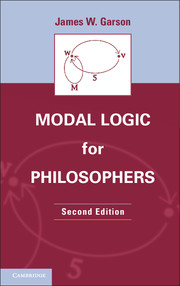Book contents
- Frontmatter
- Contents
- Preface to the Second Edition
- Preface
- Introduction: What Is Modal Logic?
- 1 The System K: A Foundation for Modal Logic
- 2 Extensions of K
- 3 Basic Concepts of Intensional Semantics
- 4 Trees for K
- 5 The Accessibility Relation
- 6 Trees for Extensions of K
- 7 Converting Trees to Proofs
- 8 Adequacy of Propositional Modal Logics
- 9 Completeness Using Canonical Models
- 10 Axioms and Their Corresponding Conditions on R
- 11 Relationships between the Modal Logics
- 12 Systems for Quantified Modal Logic
- 13 Semantics for Quantified Modal Logics
- 14 Trees for Quantified Modal Logic
- 15 The Adequacy of Quantified Modal Logics
- 16 Completeness of Quantified Modal Logics Using Trees
- 17 Completeness Using Canonical Models
- 18 Descriptions
- 19 Lambda Abstraction
- 20 Conditionals
- Answers to Selected Exercises
- Bibliography of Works Cited
- Index
9 - Completeness Using Canonical Models
Published online by Cambridge University Press: 05 June 2014
- Frontmatter
- Contents
- Preface to the Second Edition
- Preface
- Introduction: What Is Modal Logic?
- 1 The System K: A Foundation for Modal Logic
- 2 Extensions of K
- 3 Basic Concepts of Intensional Semantics
- 4 Trees for K
- 5 The Accessibility Relation
- 6 Trees for Extensions of K
- 7 Converting Trees to Proofs
- 8 Adequacy of Propositional Modal Logics
- 9 Completeness Using Canonical Models
- 10 Axioms and Their Corresponding Conditions on R
- 11 Relationships between the Modal Logics
- 12 Systems for Quantified Modal Logic
- 13 Semantics for Quantified Modal Logics
- 14 Trees for Quantified Modal Logic
- 15 The Adequacy of Quantified Modal Logics
- 16 Completeness of Quantified Modal Logics Using Trees
- 17 Completeness Using Canonical Models
- 18 Descriptions
- 19 Lambda Abstraction
- 20 Conditionals
- Answers to Selected Exercises
- Bibliography of Works Cited
- Index
Summary
Not all the systems mentioned in this book have been shown to be complete, only the ones for which a method has been described for converting trees into proofs. In this section, a more powerful strategy for showing completeness will be presented that applies to a wider range of propositional modal logics. It is a version of the so-called Henkin or canonical model technique, which is widely used in logic. This method is more abstract than the method of Chapter 8, and it is harder to adapt to systems that include quantifiers and identity, but a serious student of modal logic should become familiar with it. The fundamental idea on which the method is based is the notion of a maximally consistent set. Maximally consistent sets play the role of possible worlds. They completely describe the facts of a world by including either A or ~A (but never both) for each sentence A in the language.
The Lindenbaum Lemma
A crucial step in demonstrating completeness with such maximally consistent sets is to prove the famous Lindenbaum Lemma. To develop that result, some concepts and notation need to be introduced. When M is a (possibly) infinite set of sentences, ‘M, A’ indicates the result of adding A to the set M, and ‘M ⊢S C’ indicates that there is a finite list H formed from some of the members of M, such that H ⊢S C. Set M′ is an extension of M, provided that every member of M is a member of M′. We say that set M is consistent in S iff M ⊬S ⊥. M is maximal iff for every sentence A, either A or ~A is in M. M is maximally consistent for S (or mc for short) iff M is both maximal and consistent in S. When it is clear from the context what system is at issue, or if the results being discussed are general with respect to S, the subscript ‘S’ on ‘⊢’ will be dropped, and we will use ‘consistent’ in place of ‘consistent for S’. It should be remembered, however, that what counts as an mc set depends on the system S. We are now ready to state the Lindenbaum Lemma.
Lindenbaum Lemma. Every consistent set has an mc extension.
- Type
- Chapter
- Information
- Modal Logic for Philosophers , pp. 193 - 208Publisher: Cambridge University PressPrint publication year: 2013



